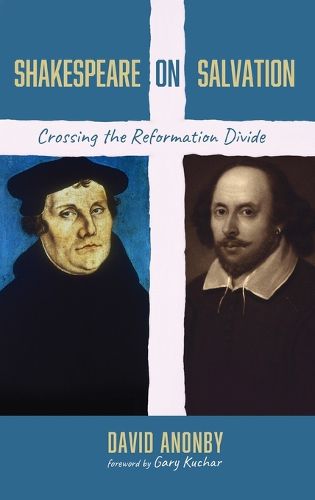Readings Newsletter
Become a Readings Member to make your shopping experience even easier.
Sign in or sign up for free!
You’re not far away from qualifying for FREE standard shipping within Australia
You’ve qualified for FREE standard shipping within Australia
The cart is loading…






This title is printed to order. This book may have been self-published. If so, we cannot guarantee the quality of the content. In the main most books will have gone through the editing process however some may not. We therefore suggest that you be aware of this before ordering this book. If in doubt check either the author or publisher’s details as we are unable to accept any returns unless they are faulty. Please contact us if you have any questions.
This cutting-edge book explores Shakespeare's negotiation of Reformation controversy about theories of salvation. While twentieth century literary criticism tended to regard Shakespeare as a harbinger of secularism, the so-called "turn to religion" in early modern studies has given renewed attention to the religious elements in Shakespeare and his contemporaries. Nevertheless, there remains an aura of uncertainty regarding some of the doctrinal and liturgical specificities of the period. This historical gap is especially felt with respect to theories of salvation, or soteriology. Such ambiguity, however, calls for further inquiry into historical theology. The author explores how the language and concepts of faith, grace, charity, the sacraments, election, free will, justification, sanctification, and atonement find expression in Shakespeare's plays. In doing so, this book contributes to the recovery of a greater understanding of the relationship between early modern religion and Shakespearean drama. While the author shares David Scott Kastan's reluctance to attribute particular religious convictions to Shakespeare, in some cases such critical guardedness has diverted attention from the religious topography of Shakespeare's plays. Throughout this study, the author's hermeneutic is to read Shakespeare through the lens of early modern theological controversy and to read early modern theology through the lens of Shakespeare.
$9.00 standard shipping within Australia
FREE standard shipping within Australia for orders over $100.00
Express & International shipping calculated at checkout
This title is printed to order. This book may have been self-published. If so, we cannot guarantee the quality of the content. In the main most books will have gone through the editing process however some may not. We therefore suggest that you be aware of this before ordering this book. If in doubt check either the author or publisher’s details as we are unable to accept any returns unless they are faulty. Please contact us if you have any questions.
This cutting-edge book explores Shakespeare's negotiation of Reformation controversy about theories of salvation. While twentieth century literary criticism tended to regard Shakespeare as a harbinger of secularism, the so-called "turn to religion" in early modern studies has given renewed attention to the religious elements in Shakespeare and his contemporaries. Nevertheless, there remains an aura of uncertainty regarding some of the doctrinal and liturgical specificities of the period. This historical gap is especially felt with respect to theories of salvation, or soteriology. Such ambiguity, however, calls for further inquiry into historical theology. The author explores how the language and concepts of faith, grace, charity, the sacraments, election, free will, justification, sanctification, and atonement find expression in Shakespeare's plays. In doing so, this book contributes to the recovery of a greater understanding of the relationship between early modern religion and Shakespearean drama. While the author shares David Scott Kastan's reluctance to attribute particular religious convictions to Shakespeare, in some cases such critical guardedness has diverted attention from the religious topography of Shakespeare's plays. Throughout this study, the author's hermeneutic is to read Shakespeare through the lens of early modern theological controversy and to read early modern theology through the lens of Shakespeare.